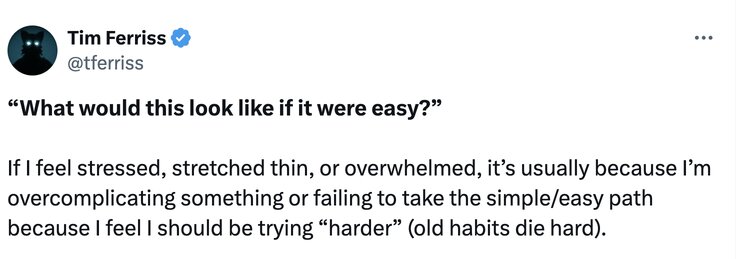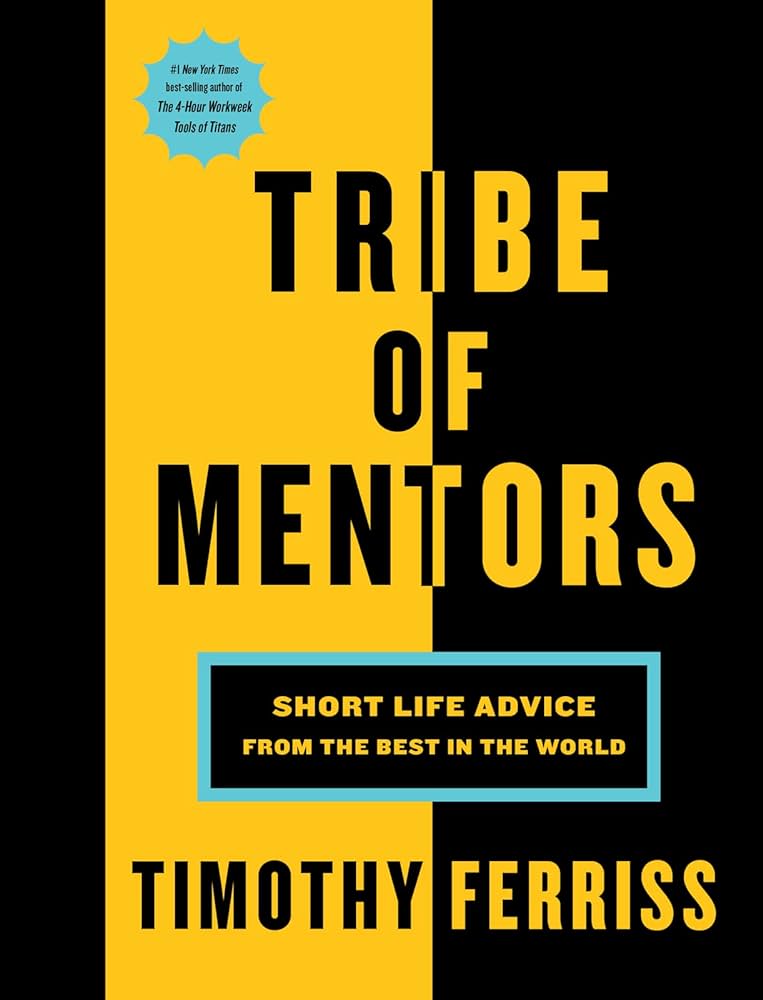In Tribe of Mentors: Short Life Advice from the Best in the World, American entrepreneur, author and host of The Time Ferriss Show shares a compilation of tools, tactics, and habits from 130+ top performers. From iconic entrepreneurs to elite athletes, artists to billionaire investors, many of the people who answered the eleven questions posed by Tim have not been featured on his podcast yet as of the book’s writing.
Tim is also the author of five #1 New York Times and Wall Street Journal bestsellers: The 4-Hour Workweek, The 4-Hour Body, The 4-Hour Chef and Tribe of Mentors. The Tim Ferriss Show has exceeded 900 million downloads and has been selected for “Best of iTunes” three years running.
Why Tim wrote the Tribe of Mentor Book
Two thousand seventeen was an unusual year for Tim. The first six months were a slow simmer. Then, within a matter of weeks, he turned 40, his first book (The 4-Hour Workweek) had its tenth anniversary, several people in his circle of friends died, and he stepped onstage to explain how he narrowly avoided committing suicide in college.
What would this look like if it were easy?
Tom asked himself the one question that helped answer many others.

One morning, while Tim was journaling on the question —–What would this look like if it were easy?—in longhand, he stumbled on an idea.
What if he assembled a tribe of mentors to help him?
What if he asked 100+ brilliant people the very questions he wanted to answer for himself? Or somehow got them to guide him in the right direction?
The 11 Questions for the tribe of mentors
Questions
Eight of the questions were fine-tuned “rapid-fire” questions from Tim’s podcast, The Tim Ferriss Show, the first business interview podcast to pass 200 million downloads. These questions have been refined over 300 interviews with guests such as actor/musician Jamie Foxx, General Stanley McChrystal, and writer Maria Popova. The remaining three questions were new additions that Tim hoped would solve my most chronic problems.
“Life punishes the vague wish and rewards the specific ask.”
If you want confusion and heartache, ask vague questions. If you want uncommon clarity and results, ask uncommonly clear questions.
- What is the book (or books) you’ve given most as a gift, and why? Or what are one to three books that have greatly influenced your life?
- What purchase of $100 or less has most positively impacted your life in the last six months (or in recent memory)? My readers love specifics like brand and model, where you found it, etc.
- How has a failure, or apparent failure, set you up for later success? Do you have a “favorite failure” of yours?
- If you could have a gigantic billboard anywhere with anything on it—metaphorically speaking, getting a message out to millions or billions—what would it say and why? It could be a few words or a paragraph. (If helpful, it can be someone else’s quote: Are there any quotes you think of often or live your life by?)
- What is one of the best or most worthwhile investments you’ve ever made? (Could be an investment of money, time, energy, etc.)
- What is one of the best or most worthwhile investments you’ve ever made? (Could be an investment of money, time, energy, etc.)
- What is an unusual habit or an absurd thing that you love?
- In the last five years, what new belief, behavior, or habit has most improved your life?
- What advice would you give to a smart, driven college student about to enter the “real world”? What advice should they ignore?
- What are bad recommendations you hear in your profession or area of expertise?
- In the last five years, what have you become better at saying no to (distractions, invitations, etc.)? What new realizations and/or approaches helped? Any other tips?
Tim’s commentary on the questions
Question 1: The Book Recommendation Question
- Man’s Search for Meaning by Viktor E. Frankl
- The Rational Optimist by Matt Ridley
- The Better Angels of Our Nature by Steven Pinker
- Sapiens by Yuval Noah Harari
- Poor Charlie’s Almanack by Charlie Munger
2. The $100 purchase question
This might seem like a throwaway, but it isn’t. It provides an easy entry point for busy interviewees while providing readers with something immediately actionable. The deeper questions elicit more profound answers, but profundity is the fiber of knowledge—it requires intensive digestion.
3. The Failure as a setup for success question
The superheroes you have in your mind (idols, icons, elite athletes, billionaires, etc.) are nearly all walking flaws who’ve maximized one or two strengths. Humans are imperfect creatures. You don’t “succeed” because you have no weaknesses; you succeed because you find your unique strengths and focus on developing habits around them. . . . Everyone is fighting a battle [and has fought battles] you know nothing about. The heroes in this book are no different. Everyone struggles.
4. The gigantic billboard question
Self-explanatory
5. The best investment question
In a live interview, it buys them time to think, and in text, it gives them a template.
6. The unusual habit question
This question has deeper implications than you might expect. Answers prove a number of helpful things: 1) Everyone is crazy, so you’re not alone. 2) If you want more OCD-like behaviors, my interviewees are happy to help, and 3) Corollary to #1: “normal” people are just crazy people you don’t know well enough.
7. The New habit, behavior or habit-improved question
This is short, effective, and not particularly nuanced. It has particular application to my midlife reassessment.
8. The what advice would you give a smart, driven college student question
We’re prone to asking “What should I do?” but less prone to asking “What shouldn’t I do?” Since what we don’t do determines what we can do, I like asking about not-to-do lists.
9. The Bad Recommendations question
Many problems of “focusing” are best solved by defining what to ignore.
10. The saying No question
Saying yes is easy. Saying no is hard.
11. The overwhelm/focus question
If your mind is “beach balling” (nerdy Mac reference to when a computer freezes), nothing else matters much until that is resolved.
As time passes and life unfolds, things you initially swatted away like a distraction can reveal depth and become unimaginably important.
As time passes and life unfolds, things you initially swatted away like a distraction can reveal depth and become unimaginably important. That cliché you ignored like a throwaway fortune cookie? Suddenly it makes sense and moves mountains. Conversely, things you initially found enlightening might run their course, like a wonderful high school coach who needs to hand you off to a college coach for you to reach the next level.
“The most fulfilled and effective people I know—world-famous creatives, billionaires, thought leaders, and more—look at their life’s journey as perhaps 25 percent finding themselves and 75 percent creating themselves.”
You are the author of your own life, and it’s never too late to replace the stories you tell yourself and the world. It’s never too late to begin a new chapter, add a surprise twist, or change genres entirely.
All the best in your quest to get better. Don’t Settle: Live with Passion.



Comments are closed.